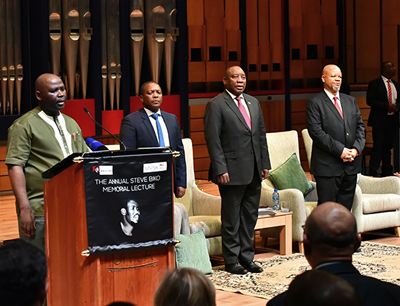News & Media
There will always be unfinished activisms

Prof Angela Davis (American civil rights activist) and Prof Mandla Makhanya (Principal and Vice-Chancellor, Unisa) during the 17th annual Steve Biko Memorial Lecture at Unisa.
Prof Angela Davis, an American civil rights activist, urged young people to emulate Biko’s courage in confronting the social injustice that breeds social ills and perpetuates racism. She was speaking during the 17th annual Steve Biko Memorial Lecture at Unisa on 9 September 2016.
Biko, known as a fearless activist and founder of the Black Consciousness movement, was killed in detention on 12 September 1977. His death followed hours of brutality at the hands of apartheid police.
Davis said young people should continue to fight for what she terms unfinished activism, which is the same kind of activism used by Biko and his generation against the apartheid regime. She said although young people should be grateful for the freedom, they had to question and interrogate the status quo.
“We are thankful for the legacies of the past, but we do not receive them without questioning. Questioning cannot end, even when victories are won,” she said
Davis slammed government for its reaction to service delivery protests, saying its use of heavy-handed tactics to peaceful protest is unacceptable in a democratic society.
“I wouldn’t have imagined that two decades after the defeat of apartheid we would be confronted with such militaristic responses to people’s protest,” she said
She added that contemporary challenges require a new form of activism, saying the scourge of racism and the level of inequality constituted a foundation upon which the new generation premised their activism.
“The revolution we wanted was not the one we produced,” Davis said.
Turning her attention to education, Davis said education is critical and is intertwined with freedom. She also used the opportunity to weigh in with her view on the current debate about free education. She praised students for their role during the #FeesMustFall campaign, and also praised the girls of Pretoria High school who raised issues around black hair, saying students have always been at the forefront of radical change.
“Steve Biko and his comrades led vast numbers of students to raise questions about apartheid and to imagine a different world, even as they clashed with the world as it was,” she said.
She also had harsh words for those who argued that free education is not feasible in South Africa.
“There are some who say the demand for free education is unrealistic. It’s unrealistic because we continue to live with the mandates of capitalism. We continue to think about education as a commodity. Freedom should mean, in the very first place, the freedom of education. The prerequisite for enjoying freedom of education should not be the capacity to pay. Young people are reminding us how retrograde our social priorities have become. They remind us of the world we should be inhabiting,” she said.
Davis urged the youth not to stop questioning the status quo, even in the face of intimidation, and the harsh effects of poverty and inequality.
“There will always be vibrant legacies. There will always be unfulfilled promises. There will always be unfinished activisms,” she said to loud applause.
Obenewa Amponsah, CEO of the Steve Biko Foundation, thanked Unisa for partnering with the foundation to host the lecture.
“I would also like to extend my appreciation to Vice-Chancellor Makhanya, Professor Fikeni, and all of the colleagues at Unisa for so firmly embracing the legacy of Steve Biko and the Foundation, as we have worked to develop and deepen this partnership since 2014.”
She said the lecture provides a critical space for dialogue and introspection about our contemporary challenges.
“The Steve Biko Memorial Lecture, and, indeed, much of our work at the Foundation, is about intergenerational dialogue, providing a space through which we as Africans can collectively examine the past, in order to learn from it, and to better understand the present, but, more importantly, understanding the past and the present so that we may, in the words of Thomas Sankara, ‘dare to invent the future’.”
She said Biko’s life continues to inspire many young to strive for the betterment for society.
“And indeed, from #RhodesMustFall to #FeesMustFall, to the recently fallen President of the University of Missouri, young people across the globe, from South Africa to Burkina Faso to Ferguson, Missouri, are inventing the future. They are, to quote Biko, ‘looking forward to a non-racial, just and egalitarian society in which colour, creed and race shall form no point of reference.’ Not only are young people looking forward to this future, they are striving daily to attain it,” she concluded.
You can watch the full lecture on video here.
Publish date: 2016/09/12


 Unisa co-hosts G20 community outreach in the Eastern Cape
Unisa co-hosts G20 community outreach in the Eastern Cape
 Unisans gain membership of prestigious science academies
Unisans gain membership of prestigious science academies
 Advocating for disability transformation through servant leadership
Advocating for disability transformation through servant leadership
 Unisa Press continues to illuminate the publishing space
Unisa Press continues to illuminate the publishing space